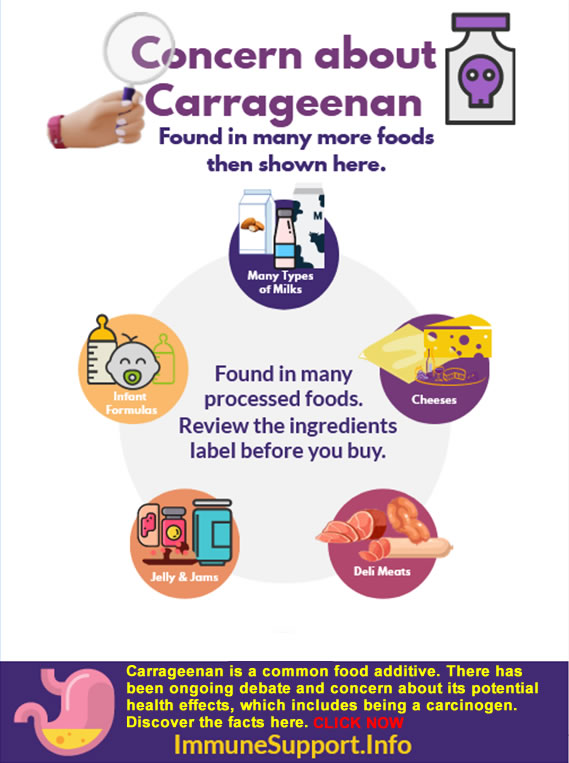Concern about Carrageenan
Carrageenan is a common food additive that is derived from red seaweed. It is widely used in the food industry as a thickening and stabilizing agent in a variety of products, including dairy alternatives, processed meats, and even toothpaste. While carrageenan has been deemed safe for consumption by regulatory authorities, there has been ongoing debate and concern about its potential health effects.
 One of the primary criticisms of carrageenan is its association with inflammation and digestive issues. Some studies, as carrageenan may trigger an inflammatory response in the digestive system, leading to gastrointestinal problems. In particular, individuals with pre-existing digestive conditions, such as ulcers[i], irritable bowel syndrome (IBS) or inflammatory bowel disease (IBD)[ii], may be more susceptible to these effects.
One of the primary criticisms of carrageenan is its association with inflammation and digestive issues. Some studies, as carrageenan may trigger an inflammatory response in the digestive system, leading to gastrointestinal problems. In particular, individuals with pre-existing digestive conditions, such as ulcers[i], irritable bowel syndrome (IBS) or inflammatory bowel disease (IBD)[ii], may be more susceptible to these effects.
The controversy surrounding carrageenan centers on its molecular structure, which is classified into two main types: degraded carrageenan and undegraded carrageenan. Undegraded carrageenan is considered safe for consumption, while degraded carrageenan, which is a smaller molecular form, has been linked to inflammatory responses in animal studies. Critics argue that the digestive system can convert undegraded carrageenan into its degraded form, also known as “poligeenan” a carcinogen (cancer causing)[iii]. In order for carrageenan to breakdown into poligeenan, carrageenan must be subject to low pH (0.9-1.3) and high temp (>80C) for several hours[iv]. Further, researchers have found poligeenan in products labeled as carrageenan. In some cases, the poligeenan level was as much as 25%[v].
Despite these concerns, regulatory agencies such as the U.S. Food and Drug Administration (FDA) and the European Food Safety Authority (EFSA) have reviewed the available scientific evidence and concluded that undegraded carrageenan is safe for use in food. However, some advocacy groups and individuals remain skeptical, calling for further research and stricter regulations.
It’s important to note that carrageenan is not an essential nutrient, and alternative thickeners and stabilizers are available for food manufacturers. Some companies have responded to consumer demand for carrageenan-free products by reformulating their products or offering carrageenan-free alternatives.
In conclusion, while carrageenan is a widely used food additive, there is ongoing debate about its safety, particularly in relation to its potential inflammatory effects on the digestive system. Consumers who are concerned about carrageenan may choose to avoid products containing this additive or opt for carrageenan-free alternatives. As research in this area continues, it remains essential for both consumers and the food industry to stay informed about the potential risks associated with carrageenan consumption.
Citations
[i] Tobacman JK. Review of harmful gastrointestinal effects of carrageenan in animal experiments. Environ Health Perspect. 2001 Oct;109(10):983-94. doi: 10.1289/ehp.01109983. PMID: 11675262; PMCID: PMC1242073.
[ii] Borsani B, De Santis R, Perico V, Penagini F, Pendezza E, Dilillo D, Bosetti A, Zuccotti GV, D’Auria E. The Role of Carrageenan in Inflammatory Bowel Diseases and Allergic Reactions: Where Do We Stand? Nutrients. 2021 Sep 27;13(10):3402. doi: 10.3390/nu13103402. PMID: 34684400; PMCID: PMC8539934.
[iii] https://www.ncbi.nlm.nih.gov/pmc/articles/PMC1242073/pdf/ehp0109-000983.pdf
[iv] James M. McKim, Jamin A. Willoughby Sr., William R. Blakemore & Myra L. Weiner (2019) Clarifying the confusion between poligeenan, degraded carrageenan, and carrageenan: A review of the chemistry, nomenclature, and in vivo toxicology by the oral route, Critical Reviews in Food Science and Nutrition, 59:19, 3054-3073, DOI: 10.1080/10408398.2018.1481822
[v] https://www.medicinenet.com/what_is_wrong_with_carrageenan/article.htm

